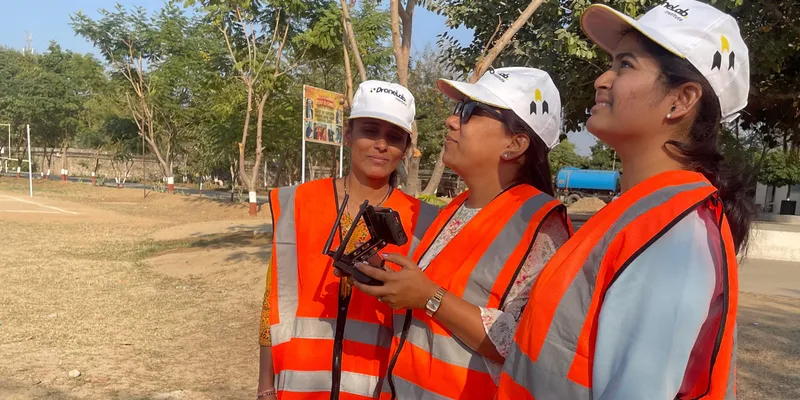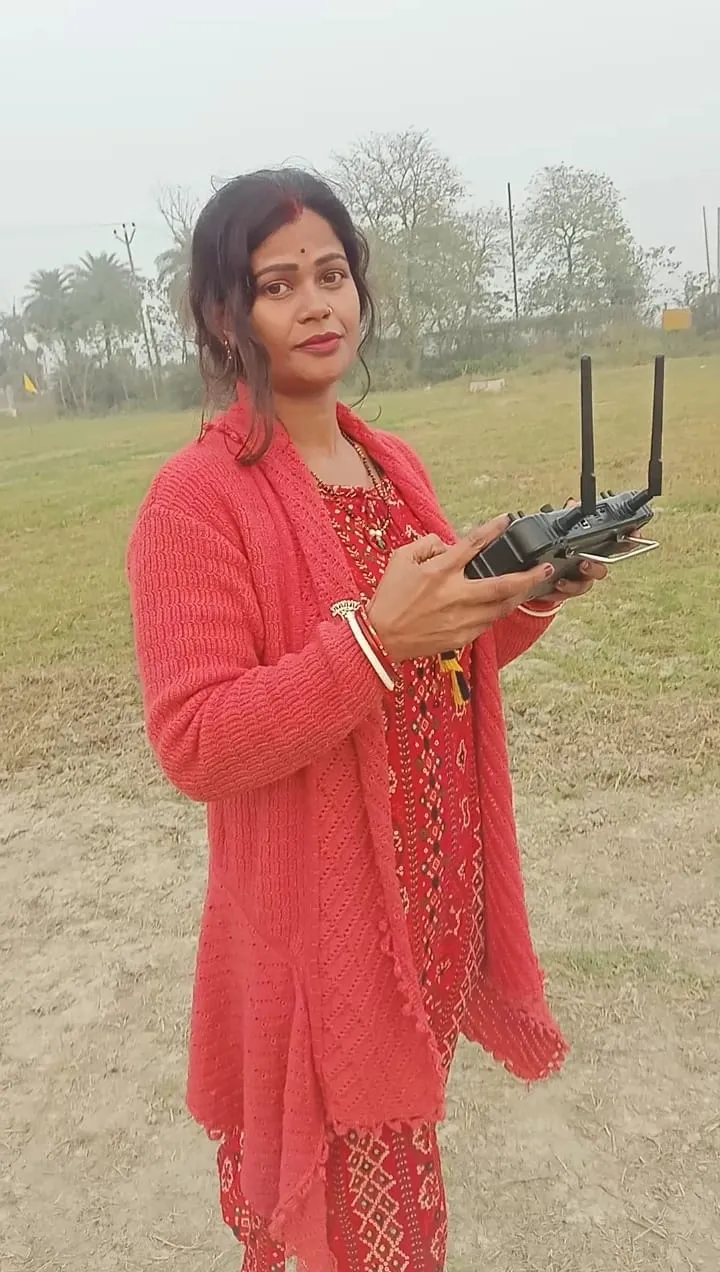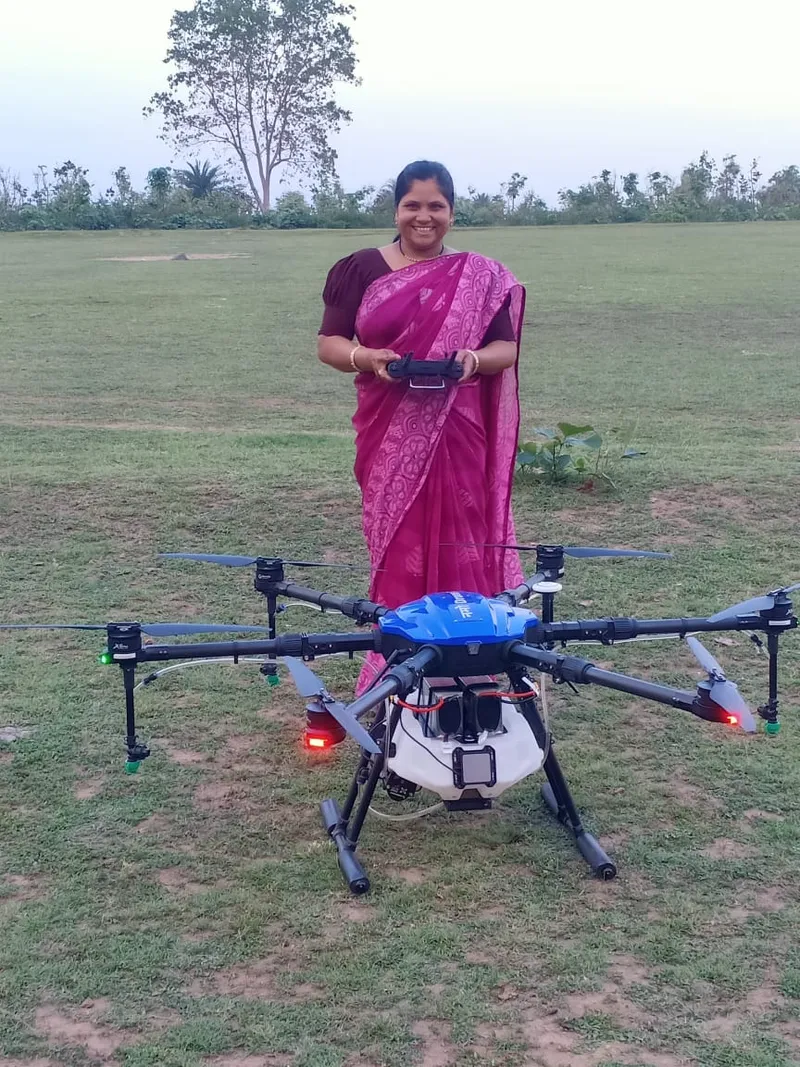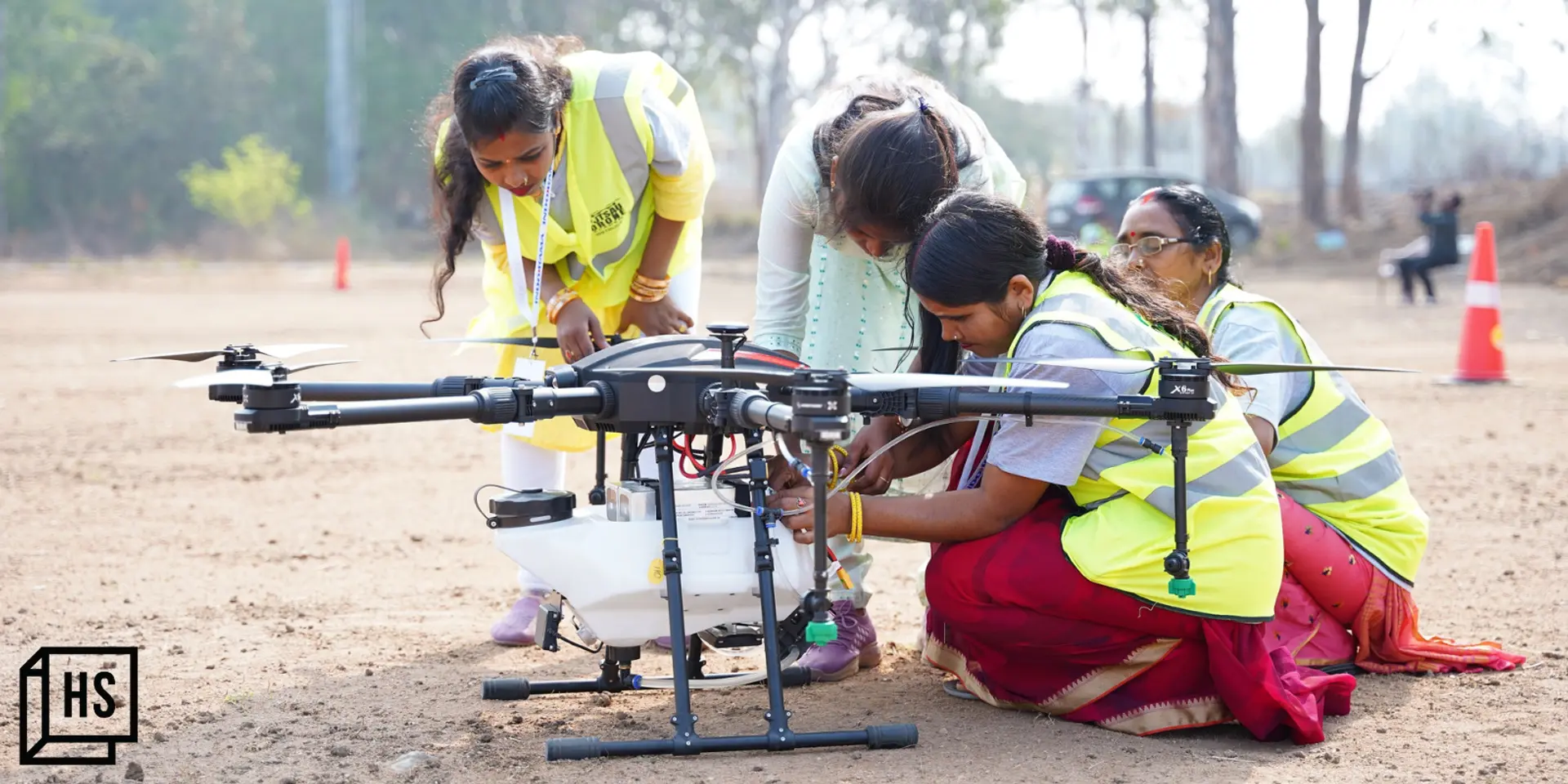Flying high: how the drone didi initiative is empowering women in rural areas
The NaMo Drone Didi Scheme aims to empower 15,000 women-led SGHs with drones to assist in agricultural activities. HerStory speaks to Drone Didis from rural India to understand how they are bringing in social change with technology.
Shaloo Rani, Badoli village, Palwal district, Haryana state–she reels off her name and location with ease, and a sense of pride.
Twenty-nine-year-old Rani is a Drone Didi, a part of the NaMo Drone Didi Scheme launched in November 2023 that aims to empower 15,000 women-led Self-Help Groups (SHGs) through agricultural drones to assist in tasks like crop monitoring, fertiliser spraying, and seed sowing. Women SHGs involved in agricultural activities are eligible to apply for this scheme.

Drone didis at a training session
On March 11 this year, Prime Minister Narendra Modi participated in the Sashakt Nari-Viksit Bharat programme at the Indian Agricultural Research Institute, Pusa, New Delhi, where he distributed 1,000 drones to beneficiary women of SHGs in villages.
Rani was among the 10 Drone Didis who demonstrated their prowess in agricultural drone operation at the event.
She is visibly excited with the huge honour given to her, and is optimistic about the prospect of being a Drone Didi.
“We had a good interaction with the Prime Minister. He asked us how we were planning to make farmers aware of the benefits of drone technology. We also demonstrated what we learned during our training,” she tells HerStory.
Rani, who holds an MSc degree in Mathematics, is highly educated by her village standards. But she complains there aren’t many job prospects where she comes from.
“Associated with a local SHG, I came to know of the Drone Didi scheme through Viksit Sankalp Bharat Yatra. The Krishak Bharati Seva Kendra in my village helped me apply and I was selected,” she says.
Rani attended training sessions organised by Drone Destination and Garuda Aerospace where she learned the theory of drone technology and its practical applications on field. At the function in Pusa, Rani was presented with a Garuda Aerospace drone.
Garuda Aerospace has so far trained 445 women across diverse locations like Naini, Ranchi, Gurugram, Masika, and Thazhambur, as part of a continuing programme.
It’s like flying an aeroplane

Kajal Kumari
Kajal Kumari from Panachhapra village in Bihar’s Muzaffarpur district is another proud drone owner under the NaMo Didi Drone Scheme. A Samuh Sakhi under Jeevika, the state’s poverty alleviation programme, she runs her own nursery providing plants and seeds to farmers.
Like Rani, she too was nominated by a self-help group, following which she underwent training in Samastipur to become a drone pilot.
The sessions, conducted by experts from Garuda Aerospace, taught her how to be a drone pilot, the tech, and how she could use the drone to earn an additional income. After receiving her own drone in March, Kumari has successfully used it to spray fertilisers on her half acre of land where she had planted red okra.
“It’s a great feeling controlling a drone; it feels like I am flying an aeroplane,” she laughs. She hopes to get work throughout the year.
Agnishwar Jayaprakash, Founder of Garuda Aerospace, explains that the pilot training programme starts with classroom sessions wherein they are firstly introduced with the basics of drone technology.
“Functioning of parts of the drone like transmitter, controller, and nozzles is explained through diagrammatic presentations and videos. They are taught about everything right from the batteries, power module and tanks to the functioning of GPS. After this, they practice flying drones on simulations so that they get a safe and controlled environment for practice and skill development. This is followed by on-field training,” he adds.
Drones for better farming
Sanju Nagpure from Balaghat district in Madhya Pradesh is a senior Community Resource Person (CRP) training and motivating 1,300 women in nine villages to take up organic farming. She started as a Krishi sakhi (farmer’s friend) in 2016, and has since become a master trainer in organic farming.
She first learned about drones in 2023, during a demonstration programme organised by Reliance Foundation’s Digital Farm School, aimed at educating women on its use and benefits.
Reliance Foundation’s Digital Farm Schools are farmer-to-farmer and expert-to-farmer learning groups. Nagpure was introduced to digital payments and later a drone through the Digital Farm School in Balaghat.
“I had not even flown a kite before. I was mesmerised when I was shown how to pilot a drone. I was selected to attend a training session in Indore by National Fertilisers Limited and learned how to mix fertilisers and water, operate the drone for spraying and later at an event in Bhopal was given additional training. I was then given my own drone,” she says.
In Varanasi, two Drone Didis, Anita Patel from Gopalpur village in Pindra block and Urmila Devi from Bisnupur in Kashi Vidyapeeth Block, have received training from Marut Drones in Hyderabad.
Patel has completed her master's and BEd, but chose to work as a counsellor for domestic violence cases in a women’s organisation. After her husband fell ill, she had to take charge of their agricultural land and unwittingly, became a farmer. The Krishi Vigyan Kendra in her panchayat and the self-help group she is part of, recommended her name to the NaMo Didi Scheme. Devi is excited by how the drone can change her life.
Under the 'NAMO Drone Didi' scheme, Marut Drones conducted an exclusive training initiative for 85 self-help group (SHG) women from Uttar Pradesh and Bihar, aiming to bridge the gender gap in agriculture by leveraging drone technology. The structured training approach ensured that participants gained both theoretical knowledge and practical experience, equipping them with essential skills to operate drones effectively in various applications, particularly in agriculture,” says Prem Kumar Vislawath, CEO and Founder of .
Looking forward to the new season

Sanju Nagpure with her drone
In the one month she has had the drone, Patel has used it to spray water on the vegetables in her farm.
She is waiting for the monsoons for more work to come her way and believes she can earn Rs 400 for spraying fertiliser on one acre of land.
Devi says she is still looking for work and is hopeful that the upcoming season will be beneficial.
Kumari wants the drone to work to everyone’s benefit.
“I have sprayed fertilisers on nearby fields. I charge around Rs 300-400 per acre. I am optimistic that I will get work throughout the year as we plant different crops. I also explain to the farmers how using a drone helps in efficient spraying of fertilisers and saves a lot of water,” she says. She is planning to buy additional drones and employ more women after they complete training as Drone Didis.
Nagpure has four acres of her own land and has also started receiving several orders for spraying. “I think I can start off by earning one lakh a year,” she says.
Rani is confident that once the sowing season starts in June-July, she can use the drone to spray pesticide on her own land and on those of other farmers in her region.
She explains, “Using a drone, it takes only 7-8 minutes to spray pesticide over an acre of land. In a day, I can easily spray 20-25 acres and earn an average income of around Rs 75,000 a month.”
There are challenges along the way. The women believe that the most important one is to change farmers’ perceptions towards this new technology for spraying. Then there are technical problems that the women cannot handle on their own’’.
Agnishwar says that has assigned dedicated points of contacts (POCs), mapped to every Drone Didi.
“After the remote drone pilot training program is successfully concluded, our POCs continue to work with them on a regular basis. I remember once a Drone Didi reached out to us for servicing her drone and the assigned POC went to her home and repaired it swiftly. This is the kind of trust we have built with Drone Didis over time,” he adds.
Vislawath too promises the same kind of commitment.
“Our support includes assistance in obtaining pilot certificates, facilitating access to government subsidies for purchasing drones, and ongoing guidance in utilising drone technology effectively in agriculture. Marut will also implement monitoring mechanisms to track the progress and success of the 'Didis' in their respective communities,” he says.
For Rani, Kumari, Nagpure, Devi, Patel, and hundreds of Drone Didis like them, the scheme offers not only additional income to support their families, but also a unique stature in the society.
“Other women look at us in awe when we pilot our drones, and with the help of technology, we are hoping there will be more employment opportunities for women, and in turn, our lives will change for the better,” says Nagpure.
Edited by Megha Reddy



